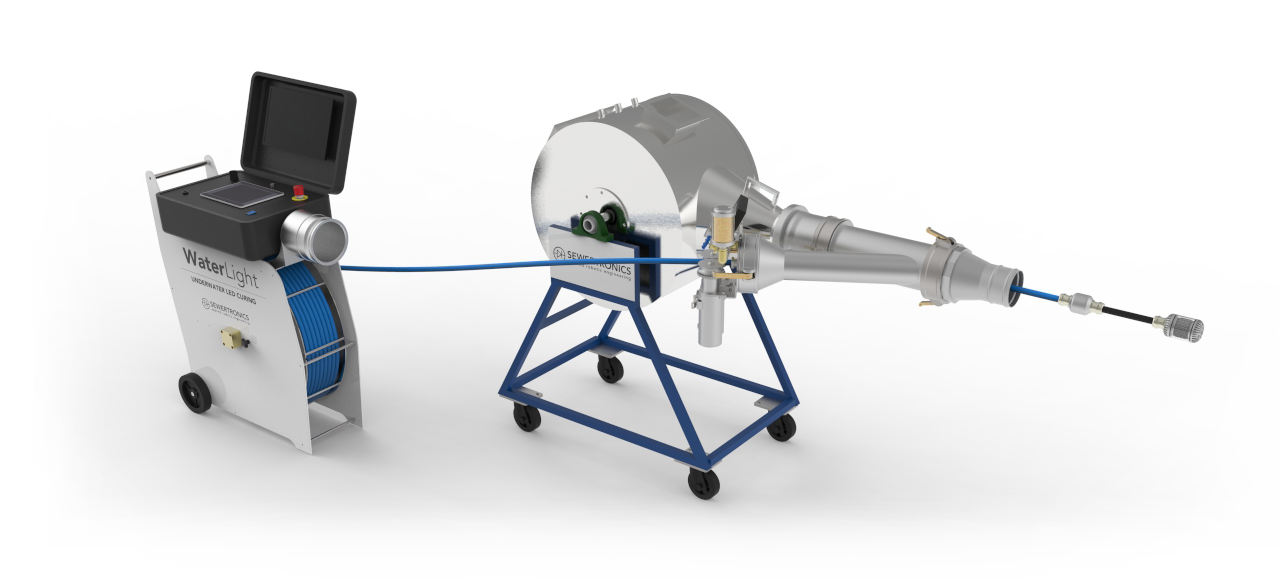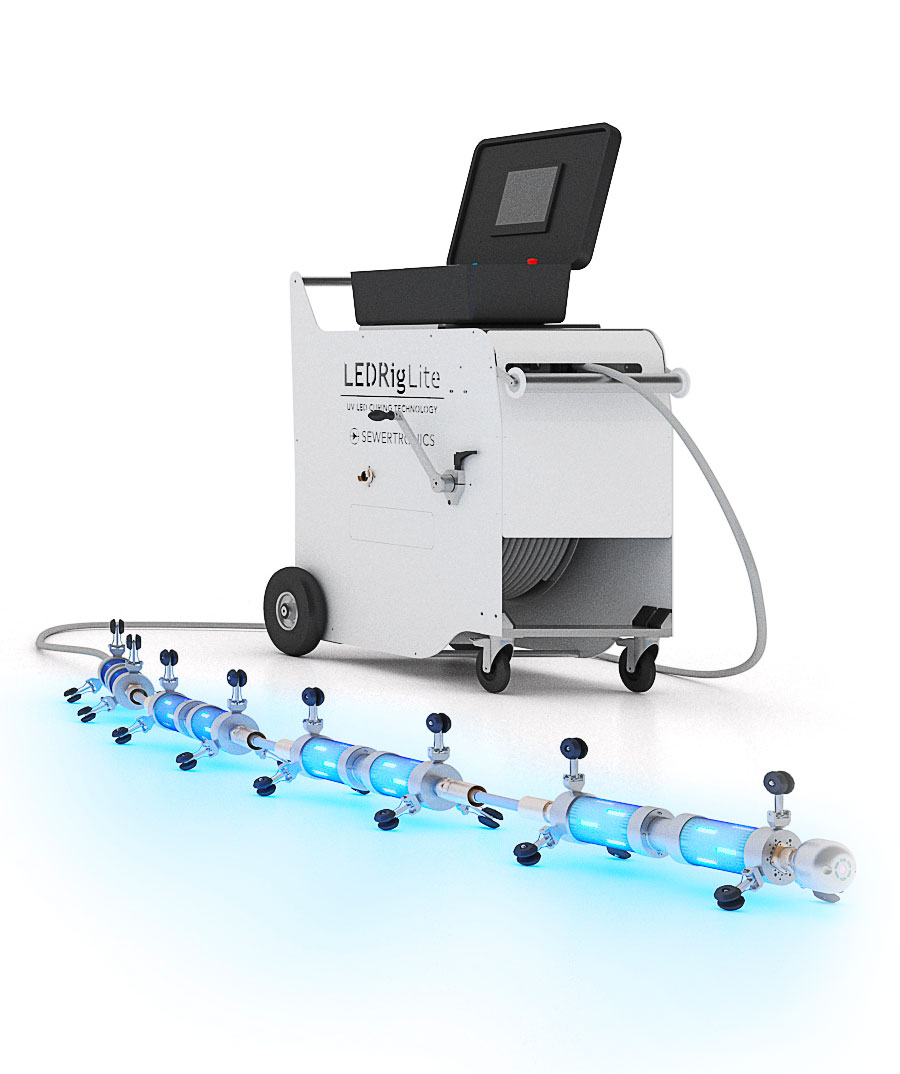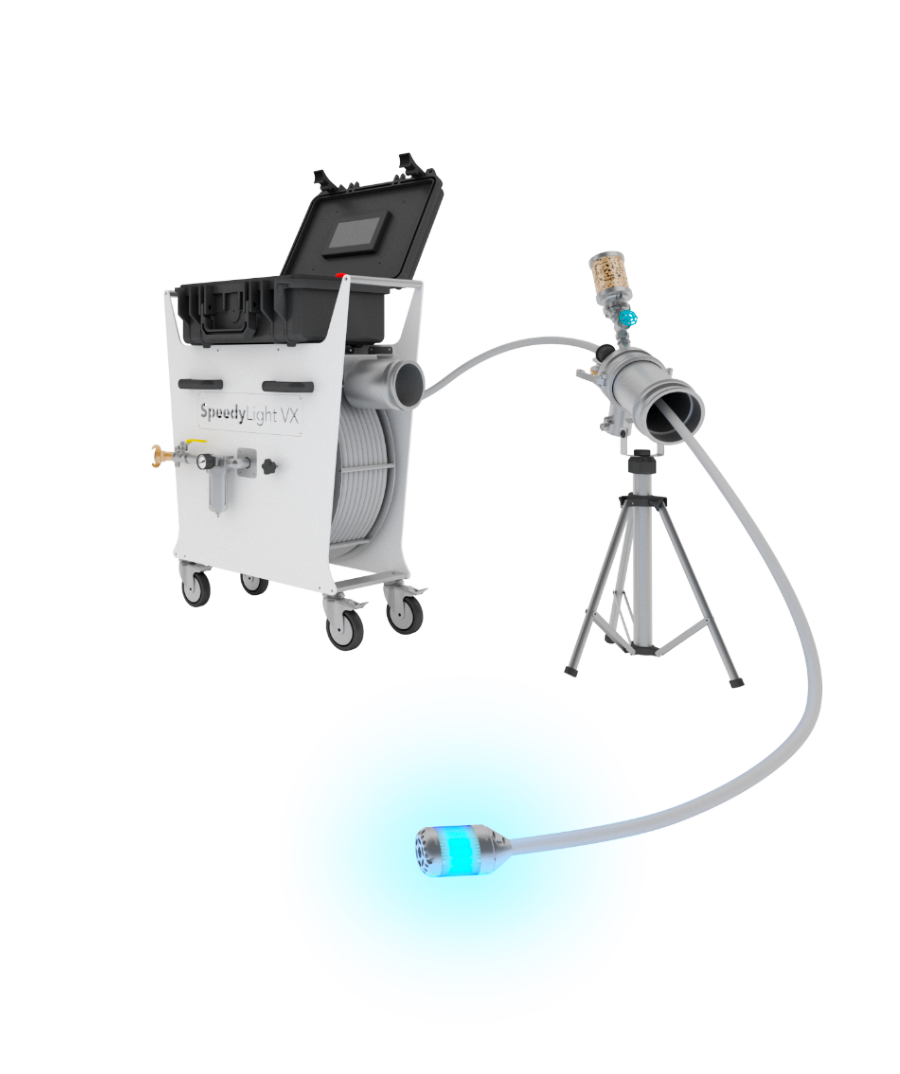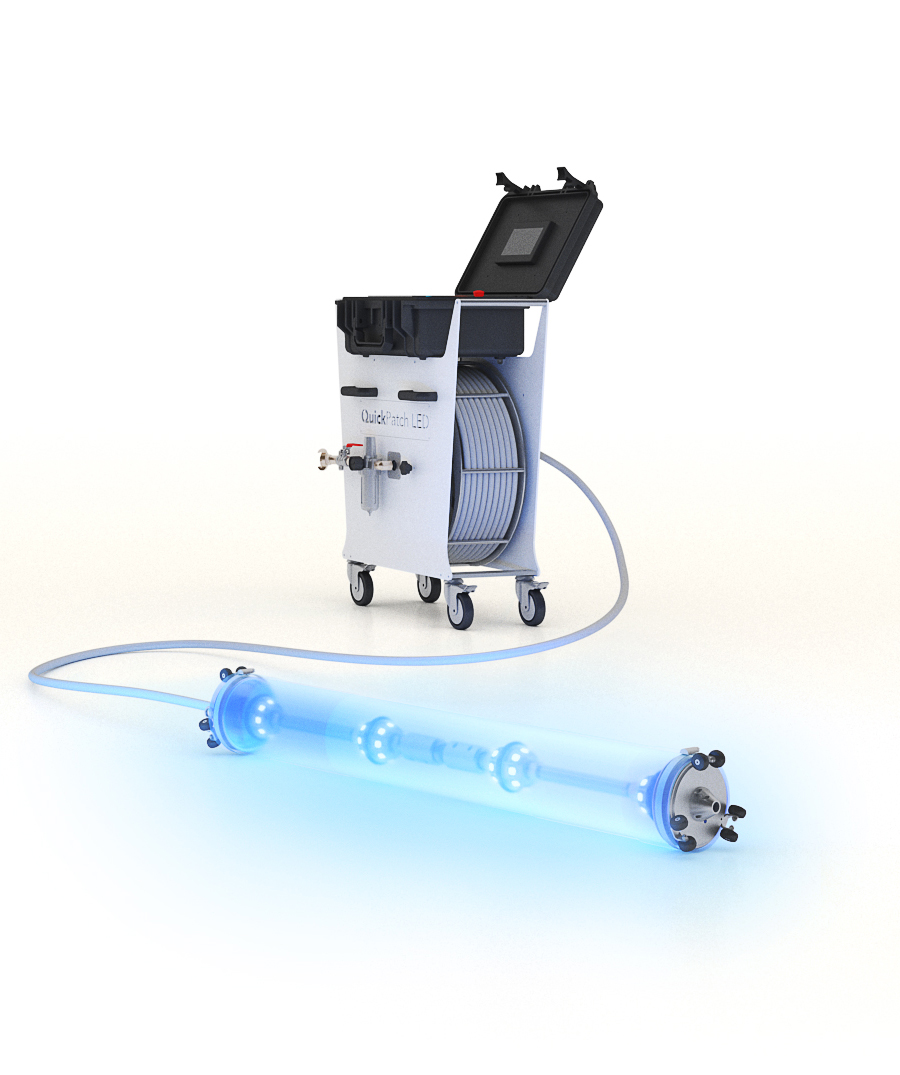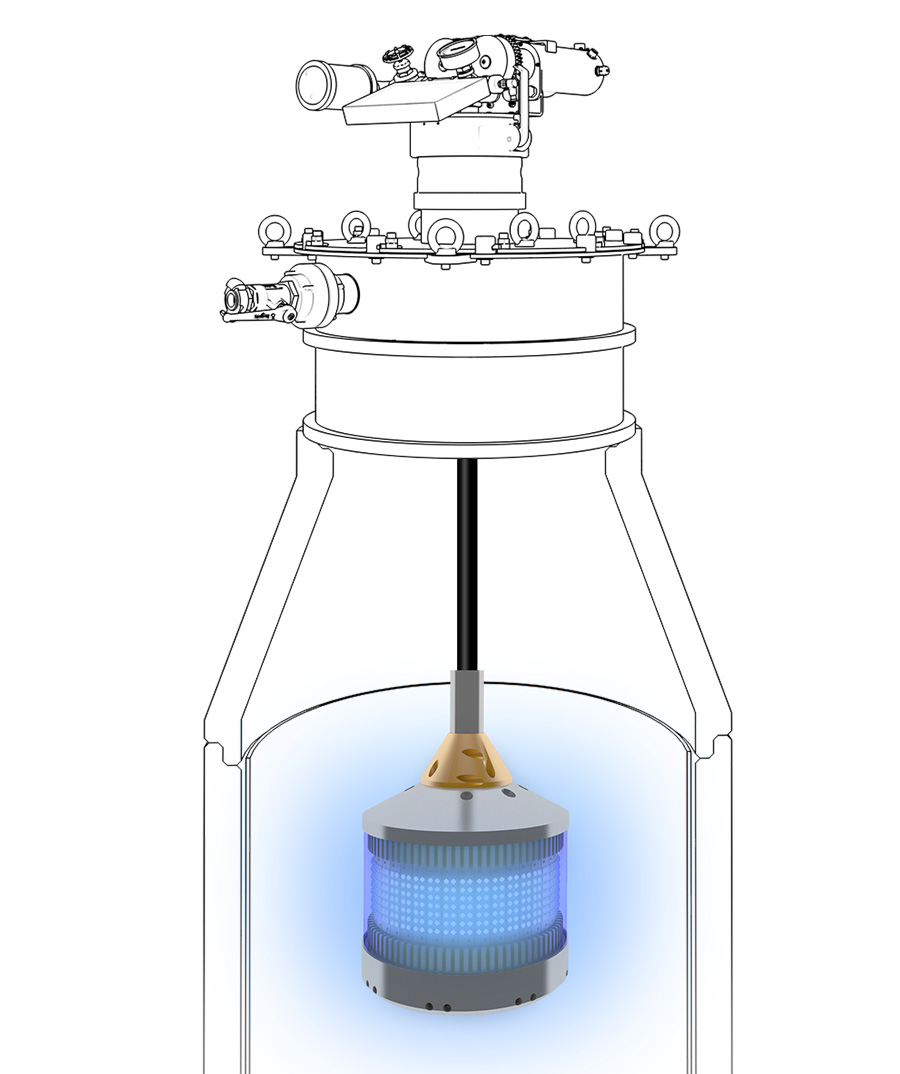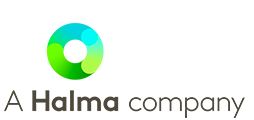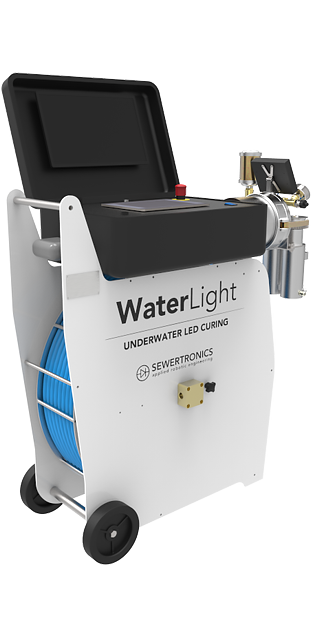WaterLight UV LED
Underwater passive cooling UV LED multi-head curing technology

WaterLight UV LED (patent pending) is the new development from SEWERTRONICS.
A fast UV LED curing technology designed to work underwater without any internal air cooling limitation. It features a multi-head design, so several heads can be sequentially connected to achieve greater UV power, increasing diameter working range and curing speed. Curing speed varies from 0.30 to 1.8 m/min, depending on the number of LED heads interconnected (up to 3) and on the diameter of the pipe to be cured. Working diameters start in DN100 and the system is capable of effectively curing liners up to DN300. Due to the low consumption of LED technology, WaterLight UV LED system can be powered from standard 220V home mains or from any 2 kW electrical source.
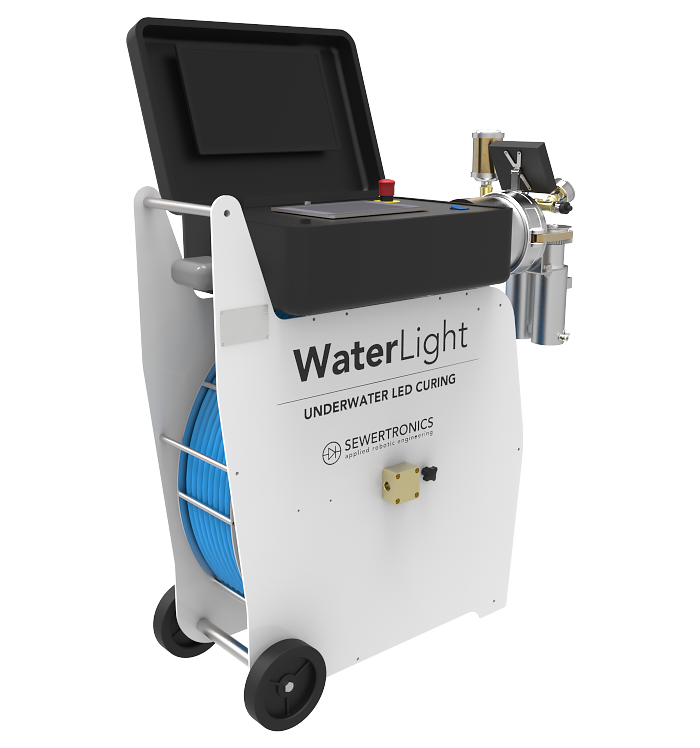
WaterLight System | System Components
| Worldwide Patent Pending | EP18382184 | WaterLight system is protected by a family of patents claiming priority of patent application EP18382184 |
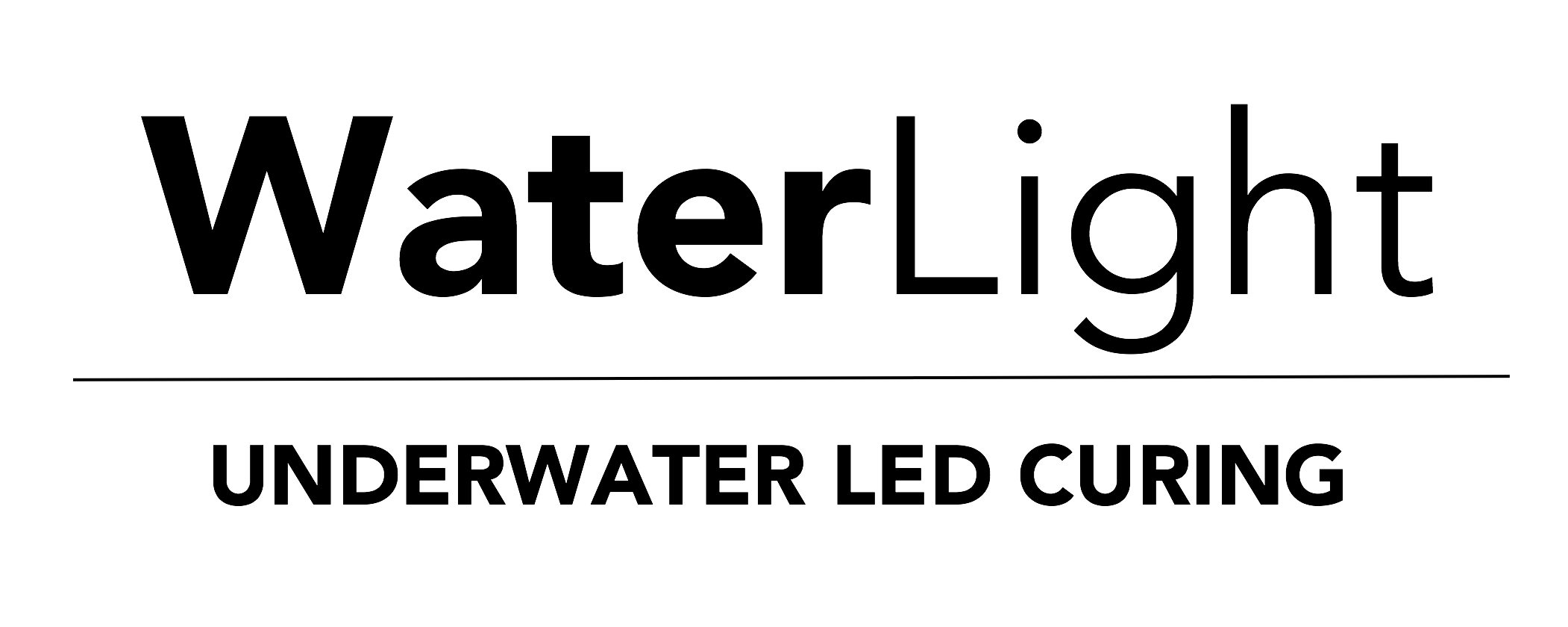
Fast UV LED curing from DN100 to DN300
Fast curing of pipes
A 20 m long DN300 mainline can be cured in 12 minutes. SEWERTRONIC’s WaterLight UV LED curing system enhances renovation productivity in a broad range of diameters.
Learn more >
Passive cooling. No airflow
Water around the head provides efficient passive cooling of the heat produced by the LED modules. No need for a compressor for this purpose on site.
Learn more >
90º bends
WaterLight UV LED smart head design successfully negotiates 90º in DN100. It’s semi-rigid hose ensures a convenient push of the head along the pipe.
Learn more >
Multiple head design
WaterLight UV LED features a multi-head design to interconnect up to 3 curing heads, allowing the unit to operate with curing diameters up to DN300 and optimizing speed.
Learn more >
Green Technology
WaterLight UV LED protects our Environment by using less power and less energy to cure. SpeedyLiner system is styrene and amine free.
Learn more >
Integrated CCTV camera
The curing head integrates a CCD sensor with a large aperture lens that in combination with a field of view of 170º deliver a crisp image of the pipe.
Learn more >
WaterLight System Specifications
| Specifications | |
|---|---|
| Working diameters | DN100 – DN300 (in option DN400 glass liner) |
| System control | Siemens PLC, proprietary software |
| UV modules power | 0-600 W |
| Number of modules | 2 (up to 4) |
| Power head voltage | 30 VDC (safety voltage) |
| Sensing | 1 temperature sensor, thermocouple |
| Cable reel | Motorized, automated |
| Umbilical cable | 50 m (DN20), possible up to 75 m |
| System weight | 80 kg |
| Dimensions | 1,36x1,09x0,6 m. Light train: 0,4 m |
| Materials | stainless steel 318, aluminium |
| Power supply | 230 VAC. Max. power: 3 kW (with 4 modules) |



The technology embedded in the WaterLight UV LED system allows contractors to cure impregnated liner at a speed that varies from 0.4 m/min to 1.8 m/min, reducing the average time at the job site and increasing the average number of jobs per day. With shot lengths of 7-8 m, WaterLight UV LED can be up to 6 times faster than traditional curing technologies. Fast UV LED curing enhances productivity.
Though the system is smart and selects the optimal curing speed, the larger the pipe section to cure, the slower the curing speed. Some physics are involved in this variation of speed: the larger the diameter and the wider the surface of liner to be cured, the lower the energy (power) density delivered to the internal surface of the pipe. Water absorption of UV radiation is not significant and hence does not affect the final performance of the system.
Curing Speeds WaterLight UV LED
In the lateral rehabilitation market, the most common diameter is DN150 (50%), followed by DN100 (20%) and DN200 in 15% of installations. The least number of renovations is performed in laterals with diameters of DN125 (10%) and DN250 (5%).
However, the scope of application of WaterLight UV LED goes beyond DN250, covering diameters ranging from DN250 to DN300 (DN400 for glass-fibre liner), and consequently entering in the mainline CIPP range.
A high-power LED array irradiates the impregnated liner, exiting some specific components that initiate an exothermic reaction curing the entire thickness of the carrier resin. Those components have been specifically designed to be sensitive to ultraviolet light at a wavelength of 400 nm. The radiation spectrum of the solid-state components ensures most of the energy is efficiently used to cure the liner. The LED components integrated in the WaterLight UV LED system are lead-free and comply with RoHS legislation.
The curing head diameter is 70 mm. With one curing head configuration WaterLight UV LED is capable to negotiate 45º bends in DN150 sections. The semi-flexible 20 mm umbilical hose allows the curing head to be pushed along the pipe to the curing start point. As curing is carried out in presence of water, it is minimizing the presence of fold lines on the surface of the cured liner.
WaterLight UV LED technology helps protect our environment. It uses less energy to cure every metre of liner, does not need a powerful compressor, and it uses resin that is styrene and amine free. Light technology is helping the industry to protect our Environment in various ways.
Multiple head design
Allowing the unit to operate with curing diameters up to DN300.
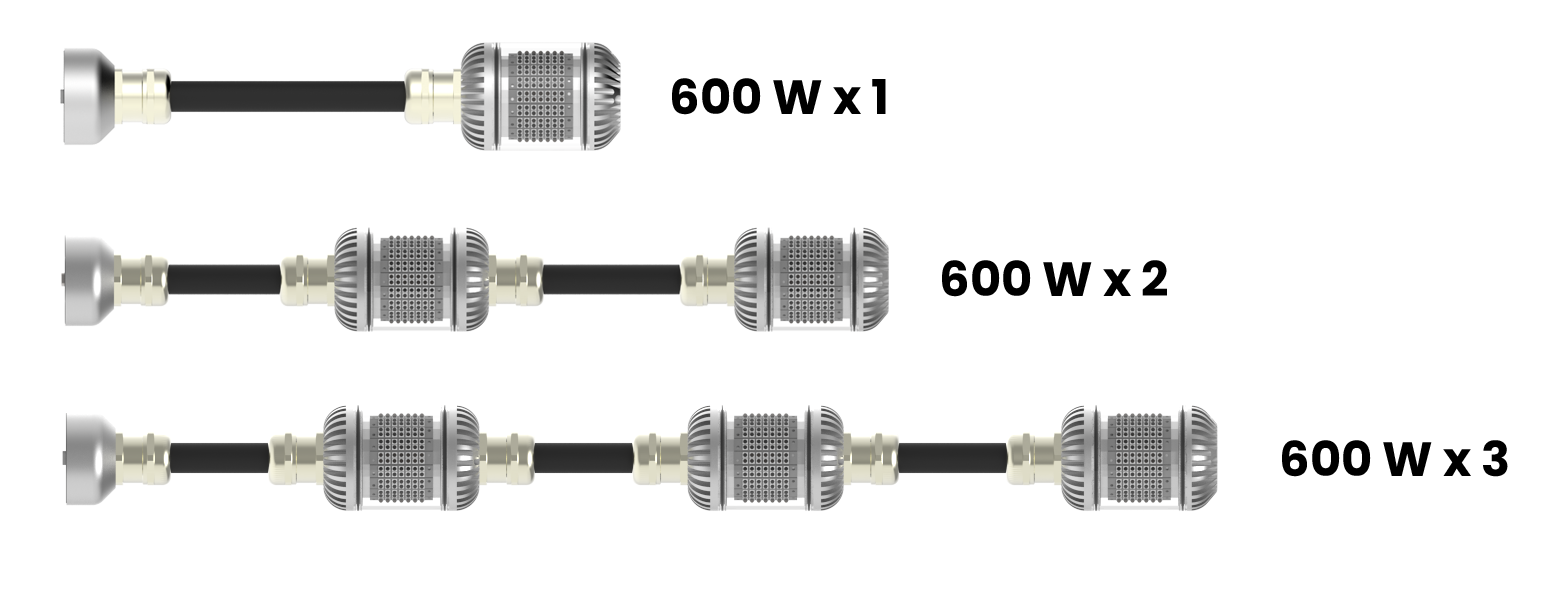
WaterLight UV LED features a multi-head design to interconnect up to 3 curing heads, allowing the unit to operate with curing diameters up to DN300 and optimizing speed. Each curing head brings 600 W of UV power to the curing process, so WaterLight UV LED radiate up to 1.200 W (double head) and 1.800 W (tripe head configuration). The WaterLight UV LED control unit is capable of driving different cable reels with the different configurations, ensuring the total control of the curing process and optimizing speeds. The last curing head includes, in addition to the LED arrays, a CCD camera to supervise the rehabilitation process.
Passive cooling. No airflow
The liner is placed in the host pipe using a water column or an air-pressurized inversion drum.
WaterLight UV LED is designed to cure the liner in the presence of cold water. Contractor might use this water to invert the liner and later to cool the curing head during the process. Water around the head provides efficient passive cooling of the heat produced by the LED modules. Hence, there is no air flow crossing the body of the curing head, avoiding the need for a compressor for this purpose on site. Water is an excellent fluid to ensure proper heat dissipation, even if this water is static. The great mass of this medium conductively exchanges energy with the dissipating plates of the curing head, with virtually no limitation of power and number of heads.
What else at the job site?
The system does not change in essence the way CIPP companies work.
First, the liner is impregnated using the traditional tools found in this industry: impregnation tables, either electrical or manual. Then, the liner is placed in the host pipe using water column or an air-pressurized inversion drum. The use of a pre-liner is recommended. And finally, keep the water inside the pipe and start the curing process. The thermal properties of water would do the job of cooling the curing head.
Rehabilitate with open-end
The rehabilitation can be done from one end of the pipe.
It is also possible to work with open-end. In situations where the second manhole is not accessible, the rehabilitation can be done from one end of the pipe, by using a dedicated transparent hose. Being transparent is essential so that the UV radiation is not blocked by the hose.
The resin. The liner.
Synthetic polyester felt carrier, impregnated with styrene-free vinyl ester resin.
SEWERTRONICS™ resin and liner system consists of a synthetic polyester felt carrier, impregnated with styrene-free vinyl ester resin. The liner is coated with PU, giving the material the necessary flexibility for smooth and easy-to-use installation. At the same time, PU polymer offers a good degree of long-wave UV light transmission.
Liner can be impregnated both at the job site or at the customer‘s impregnation facility. In both cases traditional impregnation tables can be used for this purpose. The styrene-free vinyl ester resin is supplied in one component, so there is no need to mix resin and hardener, avoiding additional work and dosing risks. The chemistry of the resin includes a special component, a photoinitiator sensitive to long-wave ultraviolet light (400 nm).
SEWERTRONIC offers impregnation services at the customer’s request.
Integrated CCTV camera.
CCD sensors with a large aperture lens.
The curing head integrates a CCD sensor with a large aperture lens that in combination with a field of view of 170º and a 3000-mW LED ring delivers a bright and sharp image. This camera provides a support to the curing procedure and is not designed to substitute a CCTV inspection system.

Y-connector.
This element is connected to the inversion drum by a Storz coupling.
As an accessory, the system also includes a Y-connector. This element is connected to the inversion drum by a Storz coupling, allowing introduction of the LED curing head inside the pressurized pipe. Plastic seals make sure no air pressure is released. SpeedyLight+ is designed to work without this element not being indispensable to conduct UV LED curing.

Maximum curing length.
Standard length is 50 m but it is possible to order units with a length of 100 m.
The system is supplied with two different cable-hose reels. Standard length is 50 m but it is possible to order units with a length of 100 m. The shorter the installation length, the more efficient the WaterLight UV LED system becomes. The reason for this lies in the fact that hot water and steam curing methods need the same curing time for any given length - a 7 m installation requires 2-4 h and the same applies to 50 m. With UV LED curing technology, curing time is proportional to the curing speed, which typically varies from 0.3 to 1.8 m/min.
